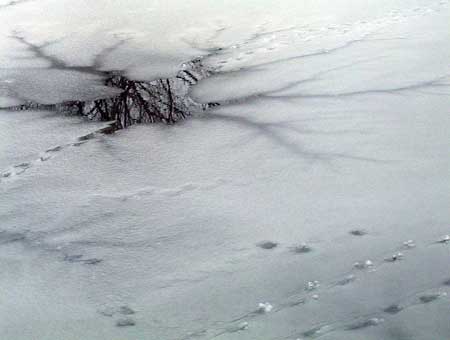During the UK winter months, our general gardening tasks are fewer but there are things we need to make sure are on our ‘to do list’. It is important that we consider the well being of the many creatures who take refuge in our gardens. They may fall victim to frosty nights. For pond owners, it is important to keep ponds wellmaintained and in a healthy balance throughout the winter.
A well manicured garden is wonderful to look at but it is not entirely appreciated by wildlife during the cold winter months. Hedgehogs or Dormouse (if you live in the south and lucky enough to have one visiting your garden), for instance appreciate a mound of dried leaves piled-up in the corner of the garden or in a protected area under a tree, in which to snuggle-up in and hibernate for winter. A pile of logs will provide a home for many insects, a ladybird ‘hotel’ made out of hollowed out bamboo sticks hung in a tree will provide a warm home to ladybirds and lacewings and hollowed out rocks and bird baths filled with rain water throughout the winter are required by birds, bees and other insects.
The cold is not a big problem for birds, but finding food is to ensure they eat enough of it to build and maintain adequate fat supplies to store on the body and ‘burn’ for energy. Putting out fat balls and keeping bird feeders full throughout the winter will help birds survive the cold weather particularly if there is snow covering their usual source of food. The smallest birds, like blue tits and goldcrests, have to effectively feed throughout the hours of daylight in winter and consume a vast quantity of food to make sure they build the necessary fat reserves to get them through the long, cold nights.
For pond owners there is essential winter maintenance which must be carried out. When the pond freezes over, you need to create an ice-free opening so gases can be exchanged and the fish can breathe. A de-icer will help keep a section of your ponds water surface ice-free to allow oxygen and gas exchange. You must be vigilant if the temperatures continue below freezing, because ammonia and carbon dioxide build up from fish breathing. Ammonia is also generated from decomposing plant material and fish waste. If these gases can’t escape, your fish can die. Plus they need oxygen to breathe.

It is also important that you clean your pond of debris, especially leaves that could decay over winter and rob the water of oxygen. Microscopic aquatic plants continue producing oxygen as long as light penetrates the pond even if iced over. However, a blanket of snow over the ice will prevent light penetration, making it impossible for the microscopic plants to produce oxygen. Combined with the decomposition of vegetation and fish waste, there may be insufficient oxygen for fish, causing them to suffocate. Snow removal, from at least a portion of your pond surface, will help reduce the likelihood of this happening.
And, lastly it is always advisable to have a walk around your pond to do a general check that the edging is in place and your pond liner isn’t exposed to possible damage by visiting wildlife to your pond. A good quality rubber pond liner is not likely to be damaged by a sudden drop in temperature or freezing conditions.
Please refer to my blog on Autumn pond maintenance for further seasonal pond tips.
While you snuggle-up next to the fire this winter, I hope that the tips I have given are enough to keep the wildlife in your garden and pond healthy and happy too. If you have any other winter pond maintenance tips, please share them with us.






Hi-ya, cool website you’ve got going here
Wayne Rooney http://www.yidubbs.com/space-uid-546836.html
You have awesome stuff listed here
Iker Casillas http://donnapreedy.com.au/index.php/blog/blogger/listings/albertarmour73
Thanks with regard to giving this kind of great subject material
Ali Daei http://www.bechbazaar.com/user/profile/16809